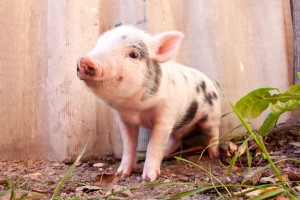
Why Go Veggie?
There are three key reasons why you might choose to raise a veggie baby — and a veggie family, for that matter: health, the environment and animal welfare.
The benefits of eating a plant-based diet are plentiful, and starting your child out as early as possible, from first foods to first full meals, will ingrain in them a lifetime of healthy eating choices. They’ll also learn what it means to care for the planet and all the animals we share it with from an early age.
For parents/caregivers not ready to go vegetarian just yet, you might just be looking to reduce the amount of meat their families consume on a weekly basis. Reasons might include budget restrictions, health concerns, stories you’ve heard in the news, allergies to food such as dairy or eggs, or campaigns such as Meatless Monday.
Whatever your reasons are, MyVeggieBaby.com is here to provide you with all the information you need to eat a more plant-based diet in a healthy, safe and informed way. You’ll learn that cooking without meat is easy to do (and might even be cheaper, too!).

Health
At MyVeggieBaby.com, we’re first and foremost interested in health — we want your babies to grow up to be the healthiest versions of themselves they can be. Raising a vegetarian or vegan baby will ensure that your child is exposed to a myriad of nutritional and physical benefits as early in life as possible, and could even help prevent some diseases.
Obesity, diabetes, high blood pressure and high cholesterol are rising at startling rates across North America, and around the world. Canada’s Childhood Obesity Foundation notes that close to 30% of Canada’s adolescents are overweight, and about 60% of adults are overweight. Similarly in the US, about one-third of children and adolescents are overweight or obese. This puts our children, and our adults, at much higher risks for heart disease, some cancers, stroke and type 2 diabetes, diseases that could be prevented through proper health and eating habits.
A vegetarian or vegan diet reduces the risks for developing heart disease, diabetes, high blood pressure, and certain cancers, such as ovarian, colorectal, and breast, because these diets tend to be low in saturated fat and high in fibre.
 Dairy products and meat are high in saturated fat, that is, fats that are usually solid at room temperature. This includes cheese, butter and the fat you can see on beef or chicken. Saturated fats raise cholesterol in the blood, as well as LDL cholesterol. LDL (low-density lipoprotein) cholesterol is considered to be the “bad” cholesterol as it collects in the walls of blood vessels. Too much build up of LDL cholesterol can eventually cause a blockage and heart attack. It can also cause obesity.
Dairy products and meat are high in saturated fat, that is, fats that are usually solid at room temperature. This includes cheese, butter and the fat you can see on beef or chicken. Saturated fats raise cholesterol in the blood, as well as LDL cholesterol. LDL (low-density lipoprotein) cholesterol is considered to be the “bad” cholesterol as it collects in the walls of blood vessels. Too much build up of LDL cholesterol can eventually cause a blockage and heart attack. It can also cause obesity.
Your body needs cholesterol to function, and so not all cholesterol is bad. HDL (high-density lipoprotein) cholesterol, aka the “good” cholesterol, removes LDL cholesterol keeping the blood vessels clear. HDL cholesterol is found in many plant-based foods, such as leafy green vegetables, soy-based products like tofu, and nuts.
Diets that include lots of fruit and vegetables can lead to improved eye health (the risks for cataracts and macular degeneration go down), and limiting dairy consumption can reduce the risks of developing arthritis later in life. Vegetarian and vegan diets can also lead to improved hair and nail health, healthier skin, and can alleviate certain allergies.
And, by eating a vegetarian or vegan diet, your veggie baby is much less likely to be exposed to harmful bacteria such as E. coli and salmonella.

Environment
 Imagine a world where your children and your children’s children can’t hike a mountain because smog is impeding all views, can’t snorkel off a pristine beach because all the fish have died off, or can’t walk in a forest because all the trees have been clear-cut for agriculture. Sounds grim, doesn’t it?
Imagine a world where your children and your children’s children can’t hike a mountain because smog is impeding all views, can’t snorkel off a pristine beach because all the fish have died off, or can’t walk in a forest because all the trees have been clear-cut for agriculture. Sounds grim, doesn’t it?
It’s no secret that humans are slowly destroying the Earth, and sadly, this is the legacy we’re leaving our little ones. Our babies are the ones we’re passing this Earth on to — and we want them to live a lifetime experiencing all the spectacular things that our great planet has to offer.
Many people feel overwhelmed when it comes to helping the environment. While we know that our planet is in danger (think global warming, diminishing coral reefs, clear cutting of the rain forests, and the depleting ozone), these problems may seem intangible to us because we don’t always see their immediate effects. And, with Earth’s large population, it seems as though every human is contributing to the decline of our planet, and so our efforts to help in some way might feel insignificant.
But, you really can help. Reducing or eliminating meat and dairy products from your diet will have enormous positive impacts on the environment. Eating a plant-based diet will mean that you will save water, wildlife and energy, stop pollution, and reduce greenhouse gas emissions.

Animal Welfare
 A love for animals is often the primary reason some people choose to eat a vegetarian or vegan diet.
A love for animals is often the primary reason some people choose to eat a vegetarian or vegan diet.
Since we’ve started accumulating books and toys for our own baby, we’ve noticed that a lot of playthings have to do with farm animals, pets and wildlife. We’re sure you’ve got your own farm animal toys, too. “The cow say ‘moo!’, ‘Old MacDonald’ takes care of the baby pigs, chickens live in the henhouse!” — sound familiar?
We love farm books and games because they’re cute and fun, and we want to teach our children about the animals of the world. But, we see the disconnect in then serving our children chicken, pork or beef for dinner.
The cute, happy cows, pigs, chickens and sheep in baby books and toys are a far cry from the reality of these animals’ lives. In North America and in other parts of the world, farm animals are factory farmed and live in grisly conditions — their pens or cages are cramped, dirty and often disease-ridden.

